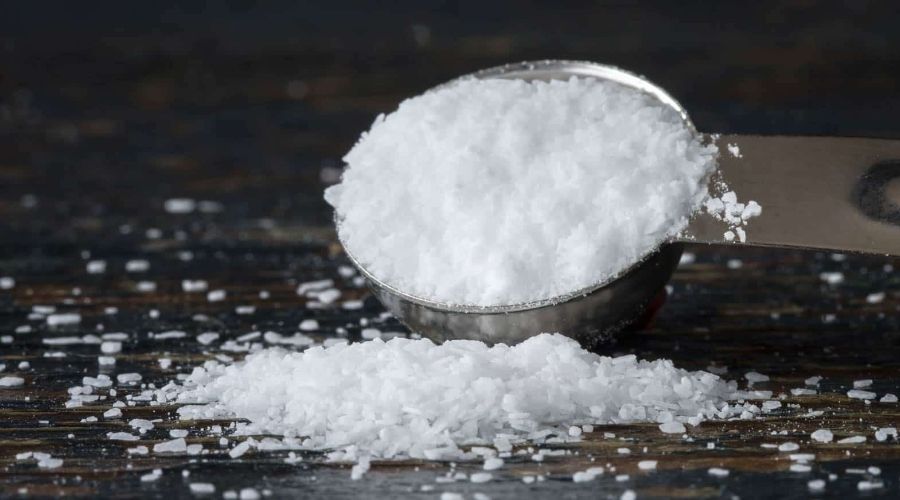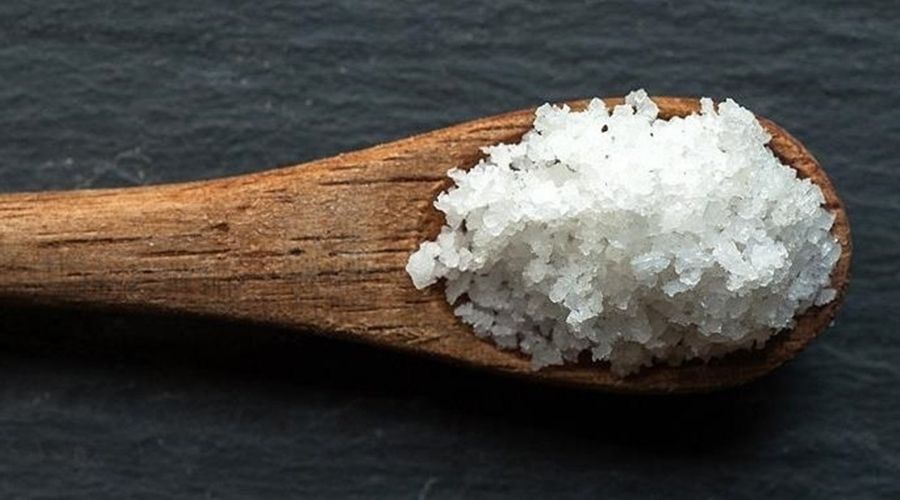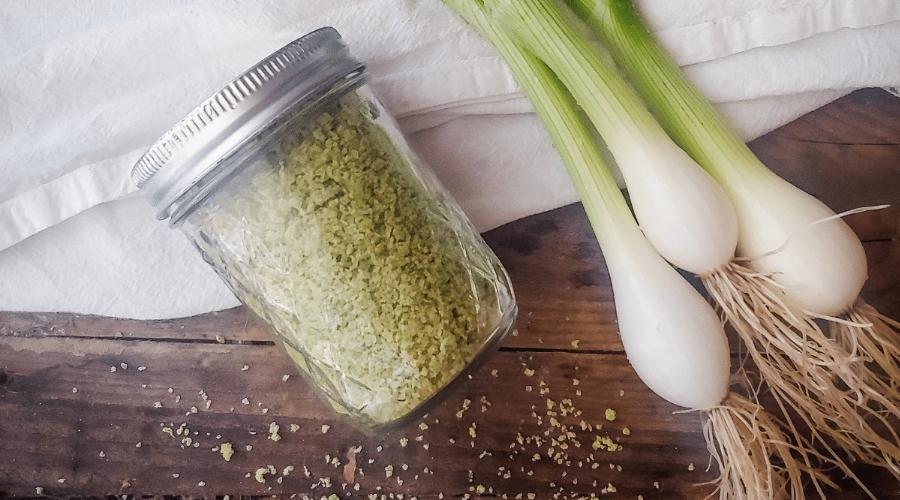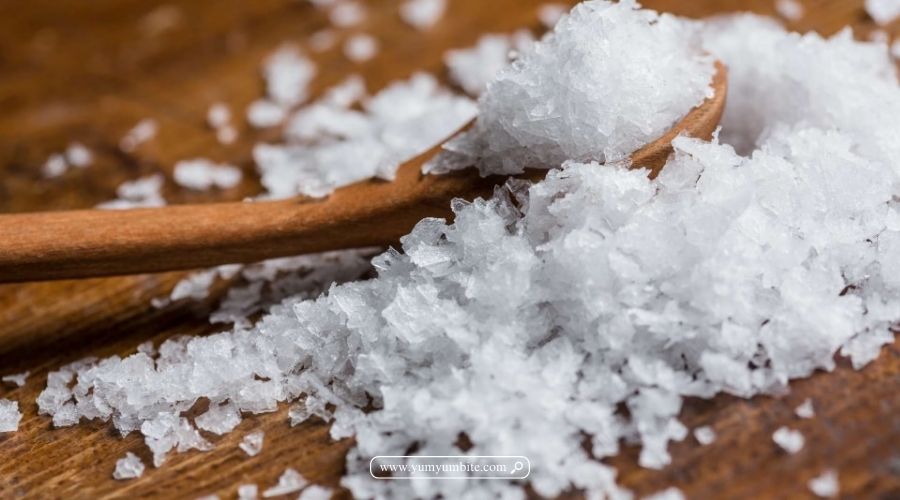Flaked salt is renowned for its delicate texture and the delightful crunch it adds to both savory and sweet dishes.
However, there are times when you might find yourself in need of a substitute, whether due to availability, dietary restrictions, or simply a desire to experiment with different flavors and textures.
Fortunately, there are numerous alternatives that can effectively replace flaked salt in your recipes.
In this article, we explore over a dozen options that can mimic the texture and enhance the flavor of your dishes, offering a range of choices from common pantry staples to gourmet salts.
Whether you’re looking for a finishing touch for your dishes or a seasoning for your culinary creations, you’ll find a suitable substitute to meet your needs.
12+ Creative Flaked Salt Substitutes for Every Culinary Challenge
Finding the perfect substitute for flaked salt can enhance your cooking and provide you with new ways to enjoy your meals.
Each alternative offers its own unique texture and flavor profile, allowing you to tailor your seasoning to your specific preferences or dietary requirements.
From the versatile coarse sea salt to the elegant Fleur de Sel, there are plenty of options to explore.
Sea Salt
Sea salt is a versatile substitute for flaked salt, offering a similar texture and a natural mineral flavor that can enhance a variety of dishes.
Like flaked salt, sea salt crystals can add a delightful crunch and burst of flavor to foods.
It works particularly well as a finishing salt for dishes such as roasted vegetables, grilled meats, or salads, where its larger crystals can be sprinkled on top for a burst of salty flavor.
However, sea salt can vary in grain size and salinity depending on its source, so you may need to adjust the amount used based on the specific brand or variety you have.
Ensure that you taste your dish as you go to avoid over-salting.
Kosher Salt

Kosher salt is another excellent alternative to flaked salt, known for its coarse texture and ability to easily dissolve.
It is often used in cooking and seasoning because its larger crystals make it easy to pinch and distribute evenly.
Kosher salt is ideal for use in recipes such as brines, marinades, and as a seasoning for meats before cooking.
Its texture allows for an even distribution of salt without the intense salinity that finer salts might impart.
Be cautious when substituting kosher salt for flaked salt, as the larger crystals mean that you might need to use slightly more kosher salt to achieve the same level of seasoning.
Himalayan Pink Salt
Himalayan pink salt is a flavorful substitute for flaked salt, known for its striking pink color and rich mineral content.
It provides a subtle, complex flavor that can enhance a variety of dishes.
Himalayan pink salt works well in recipes where you want to add a touch of elegance, such as finishing salts for steaks, seafood, or gourmet dishes.
Its coarse crystals can mimic the texture of flaked salt, but be aware that its unique mineral content can alter the flavor profile of your dish slightly.
It’s best used sparingly to ensure it complements rather than overwhelms other flavors.
Maldon Salt
Maldon salt is a premium sea salt known for its delicate, flaky texture and clean, mild flavor. It is an excellent substitute for flaked salt due to its crisp, light flakes that provide a similar crunch and burst of saltiness.
Maldon salt is ideal for finishing dishes, such as salads, roasted meats, or baked goods, where its texture can be appreciated.
It can also be used to add a sophisticated touch to desserts like chocolate or caramel confections.
While Maldon salt is a high-quality option, it can be more expensive than other salts, so it may be worth reserving for special occasions or key recipes.
Coarse Sea Salt
Coarse sea salt is a suitable substitute for flaked salt, providing a similar large-grain texture that can add a satisfying crunch and burst of flavor. It’s ideal for seasoning and finishing dishes where you want to impart a robust salty taste and texture.
Coarse sea salt is often used in recipes like roasted vegetables, steaks, and bread crusts.
The larger crystals of coarse sea salt can be used in a 1:1 ratio as a replacement for flaked salt, though you may need to adjust the quantity to suit your taste preferences.
Keep in mind that coarse sea salt can sometimes be saltier than flaked salt, so it’s a good idea to taste your food as you season.
Fleur de Sel

Fleur de Sel is a premium, hand-harvested sea salt known for its delicate, flaky texture and subtle, nuanced flavor.
It can be an excellent substitute for flaked salt, particularly when used as a finishing salt to enhance the flavor and presentation of your dishes.
Fleur de Sel works wonderfully on top of pastries, chocolates, or grilled meats, where its light, flaky crystals can provide a touch of elegance and a delicate burst of salty flavor. Due to its high cost, it’s best used sparingly to elevate special dishes.
Its fine flakes may dissolve quickly in cooking, so it’s most effective when added just before serving.
Celtic Sea Salt
Celtic sea salt is another alternative that can substitute for flaked salt. It is harvested from sea beds and has a moist, coarse texture with a balanced mineral flavor.
This salt is ideal for use in cooking and as a finishing touch on dishes like roasted chicken, salads, and vegetables.
Celtic sea salt has a natural, briny taste that adds depth to recipes without being overwhelming.
Be cautious when using it as a direct substitute for flaked salt, as its moisture content can affect the texture of some recipes.
Adjust the quantity according to taste and recipe requirements, especially when used in baking or dry rubs.
Table Salt
Table salt, although finer and more processed than flaked salt, can serve as a substitute in a pinch.
Its small, uniform crystals dissolve quickly and evenly, making it suitable for seasoning dishes during cooking or baking.
While it doesn’t replicate the texture of flaked salt, table salt can still provide the necessary salty flavor.
It’s best used in recipes where the salt is incorporated into the dish, such as in batters, doughs, or sauces.
When using table salt as a substitute, start with a smaller amount and adjust to taste, as it is more concentrated than flaked salt and can lead to over-seasoning if not measured carefully.
Herb Salt
Herb salt, which combines salt with dried herbs and spices, can be a flavorful substitute for flaked salt.
It adds a layer of complexity to dishes, infusing them with aromatic qualities.
Herb salt works particularly well in recipes like roasted vegetables, grilled meats, or pasta dishes, where it can enhance both flavor and visual appeal. The blend of salt and herbs allows for a nuanced taste experience, making it ideal for seasoning without the need for additional fresh herbs.
When substituting herb salt for flaked salt, keep in mind that it will impart extra flavors, so it may not be suitable for all recipes, especially those where a neutral salt flavor is preferred.
Garlic Salt
Garlic salt, which combines salt with garlic powder, is a versatile substitute for flaked salt, especially in savory dishes.
It adds a robust garlic flavor along with the saltiness, making it ideal for seasoning meats, vegetables, or even popcorn.
Garlic salt can enhance the depth of flavor in recipes like marinades, rubs, and roasted dishes.
However, because it contains garlic powder, it may not be appropriate for all dishes, particularly those where a pure salt flavor is needed.
When using garlic salt as a substitute, you may need to adjust the amount of other seasonings in your recipe to balance the added garlic flavor.
Onion Salt

Onion salt, which combines salt with onion powder, is another flavorful alternative to flaked salt.
It provides a savory, oniony taste along with the saltiness, making it a great option for seasoning soups, stews, and roasted dishes.
Onion salt can enhance the overall flavor profile of your dishes, particularly those that benefit from an extra layer of savory complexity.
Like garlic salt, onion salt may not be suitable for recipes where a neutral salt flavor is desired.
Adjust the quantity based on the desired intensity of onion flavor, and consider reducing other sources of onions or garlic in your recipe to maintain balance.
Dried Herb and Salt Blends
Dried herb and salt blends, such as those containing a mix of dried rosemary, thyme, and salt, can be used as a substitute for flaked salt to add both flavor and texture.
These blends offer a combination of saltiness and herbal notes, making them perfect for seasoning roasted meats, vegetables, and salads.
They can elevate the taste of dishes by adding complex flavors with minimal effort.
However, the presence of herbs in the blend means that it may not be suitable for recipes where a pure salt flavor is necessary.
Use these blends as a finishing touch or seasoning during cooking to enhance the flavor of your dishes.
How to Make Flaked Salt Substitute at Home
Creating a homemade substitute for flaked salt is a practical solution when you’re out of the real thing or want to experiment with different flavors and textures.
This simple recipe uses common kitchen ingredients to replicate the delicate, crunchy texture of flaked salt, making it a versatile option for seasoning and garnishing a variety of dishes.
With just a few ingredients and a little bit of time, you can produce a salt substitute that enhances the flavor and presentation of your meals.
Ingredients:
- 1 cup coarse sea salt
- 2 tablespoons baking soda
- 2 tablespoons water
- Optional: 1 teaspoon dried herbs (such as rosemary or thyme) for added flavor
Instructions:
- Preheat Oven: Preheat your oven to 350°F (175°C).
- Prepare Salt Mixture: In a mixing bowl, combine the coarse sea salt and baking soda. Stir well to ensure that the baking soda is evenly distributed throughout the salt.
- Add Water: Gradually add the water to the salt mixture, stirring constantly until the salt begins to clump together. You want the mixture to be slightly damp but not overly wet.
- Spread on Baking Sheet: Spread the salt mixture evenly on a baking sheet lined with parchment paper. If you’re adding dried herbs for extra flavor, sprinkle them over the salt mixture now and gently mix them in.
- Bake: Place the baking sheet in the preheated oven and bake for 10-15 minutes, or until the salt mixture has dried out and formed flakes. Stir occasionally to ensure even drying and prevent burning.
- Cool and Crush: Remove the baking sheet from the oven and allow the salt to cool completely. Once cool, use a spatula or spoon to break up any large clumps and crush the salt into smaller flakes if needed.
- Store: Transfer the flaked salt substitute to an airtight container for storage. It can be kept for up to six months in a cool, dry place.
Making your own flaked salt substitute at home is not only a cost-effective solution but also an opportunity to customize the salt to your taste.
The process is straightforward and utilizes ingredients you likely already have in your kitchen.
The result is a homemade flaked salt that provides the same satisfying crunch and burst of flavor as store-bought varieties.
Whether you use it to season your meals or as a finishing touch for your favorite dishes, this substitute will enhance the taste and presentation of your food.
Plus, you can experiment with adding different herbs or spices to tailor the flavor profile to your liking.
This homemade flaked salt substitute is a great way to elevate your cooking and ensure you always have the perfect salt on hand.
1. What is a good substitute for flaked salt in recipes?
A good substitute for flaked salt includes coarse sea salt, kosher salt, or Maldon salt.
Coarse sea salt and kosher salt can provide a similar texture and are often used in cooking. Maldon salt, known for its delicate flakes and mild flavor, works well as a finishing salt.
Each of these alternatives can be used depending on whether you need a seasoning or a garnish.
2. Can I use table salt as a substitute for flaked salt?
Yes, you can use table salt as a substitute for flaked salt, but it’s important to use less of it due to its finer texture and higher salinity.
Table salt dissolves quickly and is more concentrated, so start with a smaller amount and adjust to taste.
It may not replicate the texture of flaked salt, so it’s best used in cooking where the salt is incorporated rather than as a finishing touch.
3. How can I make a homemade flaked salt substitute?
To make a homemade flaked salt substitute, mix coarse sea salt with baking soda and a bit of water.
Spread the mixture on a baking sheet and bake until the salt is dry and flaky. Once cooled, break it into flakes.
This method helps replicate the texture of flaked salt and can be customized with herbs for added flavor.
4. Is there a gluten-free substitute for flaked salt?
Yes, most flaked salt substitutes are naturally gluten-free. Options such as sea salt, kosher salt, or Himalayan pink salt are all gluten-free.
Ensure that any pre-packaged salt you use is certified gluten-free if you have severe sensitivities or celiac disease.
Homemade alternatives using sea salt and baking soda are also gluten-free.
5. Can I use flaked salt substitutes in baking?
Flaked salt substitutes can be used in baking, but their effectiveness depends on the recipe.
Coarse sea salt and kosher salt can be used in doughs and batters, but they may not fully dissolve like finer salts.
For recipes where texture and distribution are important, use a substitute that mimics the texture of flaked salt as closely as possible.
For best results, consider how the substitute will affect both the flavor and texture of your baked goods.
References
- https://www.quora.com/What-are-some-substitutes-for-sea-salt-flakes
- https://www.quora.com/What-are-some-good-substitutes-for-flake-salt
- https://www.alphafoodie.com/how-to-make-flaky-salt/
- https://www.nigella.com/ask/sea-salt-flakes


